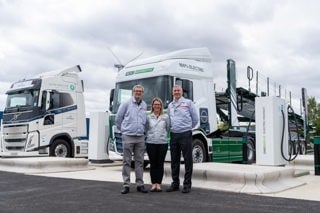James McKemey, head of insights at Pod Point
Environmental improvements caused by coronavirus lockdown have changed public attitudes.
Whether it’s data from the Royal Netherlands Meteorological Institute showing the reductions of nitrogen dioxide (NO2) concentrations in Rome, Madrid and Milan (40%), or Paris (54%), or surveys showing that that 51% of the public have noticed the cleaner air - it’s clear the coronavirus lockdown has caused measurable environmental improvement. Having had a taste of cleaner air and reduced emissions, many don’t want to go back.
Vehicle electrification offers the opportunity to keep these particular air quality improvements (and more) for the long term, without economic downside. It would also put a significant dent in the UK’s climate change exacerbating CO2 emissions. Switching all UK cars to electric vehicles (EVs) would slash emissions by 12%, removing 42 million tonnes of CO2 from the atmosphere and reducing the transport sector’s emissions by more than 42% as a result (according to Nottingham Trent University).
How will the fleet sector respond?
Regulatory uncertainty and risks
Environmental progress is not guaranteed. With some OEMs already calling for relaxation of the EU emissions legislation, removing penalties for higher emitting vehicles in an attempt to relieve some of the economic pressure on the challenged automotive industry; there is a fear that the period of recovery from the coronavirus outbreak could see the de-prioritisation of the environment in favour of the economy.
We are hopeful regulatory support for EVs will prevail.
The business case for fleet electrification remains strong
Regardless of the oil shock, the running costs (both fuel and servicing) of an internal combustion engine (ICE) will remain substantially higher than those of running a full battery electric vehicle (BEV). Coupling this to the available incentives allow many fleets to save money by choosing an electric car today. As battery costs continue to fall (a process that will not cease from the pandemic), the group for whom the electric car makes financial sense will continue to grow.
Of course, it is fleet managers who best make sense of lower total cost of ownership - consumers often more influenced by up front costs.
Fleet electrification will play a leading role in UK EV adoption - and thus the whole decarbonisation agenda
In 2018, 52% of new vehicles hit the road in the UK via fleet procurement, this alone makes the fleet sector truly critical to the uptake of EVs. Those vehicles will enter the second hand market, where most consumers obtain their cars, thereby (eventually) replacing the ICE vehicle parc.
With the potential to bring such volume to the UK’s roads, the fleet sector is critical to the development of the infrastructure sector. Direct demand for charging is the most potent driver of charging infrastructure growth, while increased utilisation provides the confidence required to make investments ahead of demand to support future EV usage.
Encouraging early signs from the automotive industry
The fleet sector can only offer the vehicles that OEMs supply. So it is critical OEMs seize the opportunity to ready their businesses for electrification.
Post-coronavirus investment decisions must target products with a longer term future. This is the time to pivot to the development of the passenger vehicles that will be in demand once recovery is here in earnest - and those are electric.
“Electrification will go faster. I think it would be naive to believe after some months, everything will return to normal, and our customers will come back into a showroom asking for diesel cars. They will ask even more for electric cars. And that is speeding up.”
Volvo CEO Håkan Samuelsson certainly pulled no punches with this assessment, but he’s not alone. With business leaders calling for a “Green Stimulus” to assist with recovery, it’s clear that there is strong willingness to capture this opportunity to reshape and steer our economy to a greener economy of the future.
We believe the now underway coronavirus recovery will prove the tipping point for mass fleet electrification. And, in combination, the fleet and charging infrastructure sectors will drive forwards the UK’s decarbonisation.



















Login to comment
Comments
No comments have been made yet.